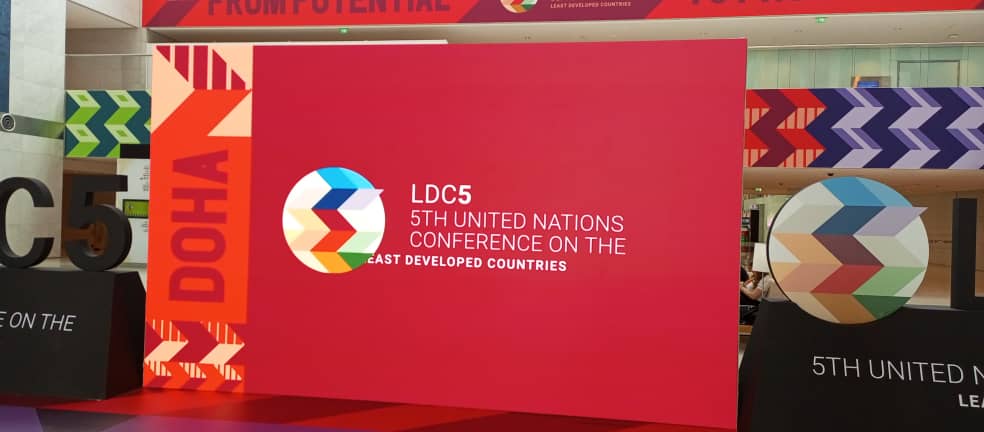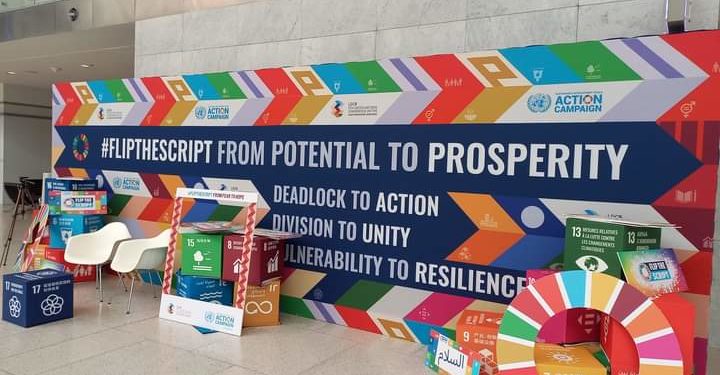By Kemo Cham in Doha
The 5th United Nations Conference on the Least Developed Countries (LDCs) is underway in the Qatari capital, Doha.
The conference, which is scheduled to officially kick off on Sunday, March 5th and ends on Thursday, March 9th, will see Heads of State and Government from across the world converge in the Qatar National Convention Center to deliberate on the progress of development in the world’s most vulnerable countries and chat a way forward to push them up the global wealth scale.
The Amir of Qatar, Sheikh Tamim bin Hamad Al Thani, is expected to officially open the event which is being held under the theme: “From Potential to Prosperity”.
The UN describes the LDC5 as “one of the most important and defining development events” in the current decade in support of the most vulnerable countries. The global body says the gathering provides an opportunity to mobilize global solidarity, support and partnerships and to leverage synergies across existing intergovernmental agreements in favour of the development needs of the LDCs.
The Doha conference comes three years after the eruption of the COVID-19 pandemic, which has exacerbated challenges faced by vulnerable countries. The meeting aims at restoring these countries’ needs at the top of the global agenda, after the pandemic disrupted the global economy.
The LDCs is a category of the UN, which comprises of countries that fall below a certain socioeconomic parameter, that leaves their populations poor. These countries – currently 46 – are said to have suffered through inadequate pandemic-fighting resources and spiraling debt, thereby retarding their development progress.
Ahead of Sunday’s official opening, a summit of heads of state and government of the LDCs was convened on Saturday, where UN Secretary General António Guterres decried the prolonged suffering of poor countries due to factors he said were created by developed nations.
“Least Developed Countries are being stranded amidst a rising tide of crisis, debt, climate chaos and deep global injustice,” Guterres said.
“The Fifth Conference on the Least Developed Countries is an opportunity for the world to step up. Countries with the least need support the most,” he added.
The UN said in a statement that many of the Least Developed Countries are already in or at risk of debt distress, and that if left unchecked, economic distress and vaccine inequity will make recoveries longer and more painful than necessary.
A notable action to be taken at the end of the conference is to agree on plans to deliver the Doha Programme of Action, which is a ten-year commitment for renewed and strengthened partnerships between the LDCs and developed nations, as well as the private sector and civil society.
Rabab Fatima, UN High Representative for the LDCs, Landlocked Developing Countries and Small Island Developing States, said all the major global issues, like climate change, COVID-19, or the spiraling prices of food and basic commodities, were problems that are felt more keenly in the LDCs.
“The LDCs are hit hardest by these shocks and are the least equipped to cope. At LDC5 the world is gathering to build a new model of partnership to help move the LDCs from countries with potential to countries that enjoy true prosperity for all,” she added.

Doha Programme of Action
The Doha Programme of Action, adopted in March last year, contains renewed and strengthened commitments between the LDCs and their development partners. The document which covers the decade of 2022-2031 identifies five key deliverables that will assist the LDCs in removing a number of structural impediments to inclusive growth and sustainable development. These include closing gaps in education, food security, investment for sustainable development and resilience to climate change, as well as to support the countries to graduate out of the category to more fully integrate into the global economy.
Guinea, Liberia and Sierra Leone are part of the UN list of LDCs, which also include West African neighbors Benin, Burkina Faso, Gambia, Guinea Bissau, Senegal and Mali.
Countries listed under the LDC category can graduate if they meet certain criteria.
The South Pacific Island nation of Vanuatu was the latest country to graduate from the category in 2020. Before that Equatorial Guinea graduated in June 2017, Samoa in January 2014, Maldives in January 2011, Cape Verde in December 2007, and Botswana in December 1994.
Seven other countries – Bhutan, Bangladesh, Laos, Nepal, Angola, Sao Tome and Principe and the Solomon Islands – are expected to graduate out of the category by 2026.






















